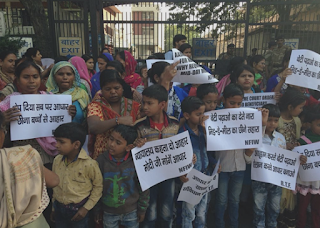Other Monitoring Mechanism:
(i) Monitoring of Accounts of Self Help Groups, NGOs etc.: There have been complaints pertaining to Self Help Groups, NGOs etc. being made conduits by the political parties/ candidates for distribution of money/ materials and being utilized for election campaigns. In as much as the revolving fund/ economic assistance is channelised through the DRDAS, it should be easily possible to monitor the SHGs closely so as to ensure that they are not utilized for distribution of money/ materials which is a corrupt practice and an electoral offence with reference to the provisions of the R. P. Act, 1951 and the IPC. The DEOS shall call for a report on alternate days regarding SHG /NGO activities in their district during the election process.
(ii) Checking Distribution of gift articles/serving of food in Marriage/ Community Halls: There are frequent complaints of Marriage Halls/ Community Halls or other big halls being utilized in the past for distribution of gift articles (like dhotis/ sarees)/ serving of food etc. The use of Marriage Halls/ Community Halls and similar places during election period should be kept under watch by the district electoral machinery with reference to the purpose of booking for which some evidence (like marriage invitation) must be obtained so that there is no camouflage of expenses for election purposes. The DEOS shall collect daily reports of such bookings and see that no fake party is being organized for influencing the voters. Report of any suspicious booking/ event should be handed over to the Assistant/Dy. Director of Income Tax. in charge of the district, who will examine the expenses from Income tax angle. Large scale feeding under the cloak of "Annadanam" outside places of worship will give room for suspicion that serving of food is being resorted to influence the voters on the eve of the election, which is a corrupt practice and an electoral offence with reference to Section 123 of the Representation of the People Act, 1951 and the provisions in Chapter IX-A of IPC. The CEOs/DEOS should ensure that in case of any suspicion about feeding on a large scale, necessary steps should be taken to prevent it.
A doubt has been raised with regard to participation of candidates in the community kitchens (langar, bhoj. etc.) organised by religious communities in their religious institutions as a matter of customary practice and the bhoj/feast, etc. offered as a matter of social practice following a ritual ceremony, like, marriage, death, etc. As per the Commission's instruction No. 76/Instruction/2011/EEM dated 05.12.2011 (Annexure-D9) expenditure on the community functions shall be treated as the election expenses of a candidate and added to account of the candidate, if any contesting candidate(s) attends the community kitchen (in whatever name has been called) either organised by him or by any other person to entertain the electors. However, this instruction does not apply to community kitchens/langars, etc. organised by religious communities within their religious institutions as a customary practice or the bhoj/feast, etc. offered by any person (other than the candidate) in the normal course to celebrate any ceremony like, marriage, death, etc., and the expenses incurred on such community kitchen/ langar/bhoj/feast, ete shall not be included in the election expenses of the candidate, provided that the candidate participates there in the normal course as a normal visitor. It shall further be ensured that the candidate does not make any financial contribution for arranging such community kitchen, etc. and no political campaign in any manner is undertaken at such community kitchen, etc. The restrictions on the community kitchens, etc., as mentioned above, shall be over after the completion of poll/ re-poll in the constituency, (Commission's Instruction letter No. 76/Instruction/2011/ EEM, dated 5th December, 2011 Annexure-D9).
It has been brought to the notice of the Commission that during the General Elections to the Legislative Assemblies of Kerala, Puducherry, Tamil Nadu and West Bengal and several bye-elections in 2016 held in some of the states, some candidates travelled from India to foreign countries for the purposes of canvassing, to seek votes of the overseas electors residing in those countries. In this context, the Commission would like to clarify that though seeking votes of overseas electors by going abroad by the candidates or their agents or party leaders is not prohibited under the law, all expenditure incurred by those candidates, their agents or party leaders on their travel, boarding, lodging etc., in those countries would be deemed to be expenditure incurred or authorized by the candidates in connection with their election. Thus, all such expenditure would come within the meaning of section 77(1) of the R. P. Act. 1951 and will have to be included by the candidates concerned in their accounts of election expenses which are subject to the limits prescribed by Rule 90 of the Conduct of Elections Rules 1961.
The Commission would, however, like to further clarify that any inducement to overseas electors by way of air tickets or any other allurements to them, in cash or kind, to come to India for the purpose of voting at the aforesaid elections would amount to the electoral offence of "bribery" within the meaning of section 171B of the Indian Penal Code, as also the corrupt practice of 'bribery' within the meaning of section 123(1) of the Representation of the People Act, 1951. Needless to add that the commission of the above mentioned electoral offence and corrupt practice of bribery would invite penal action against them under the relevant provisions of law. Further, any other person or organization offering to bear the travel expenses of overseas electors to India in connection with the voting in the above elections, or any other such allurements to them to seek their votes, with the consent of the candidate or his election agent, would also attract the same penal action against them. (Annexure-D20).






0 Comments